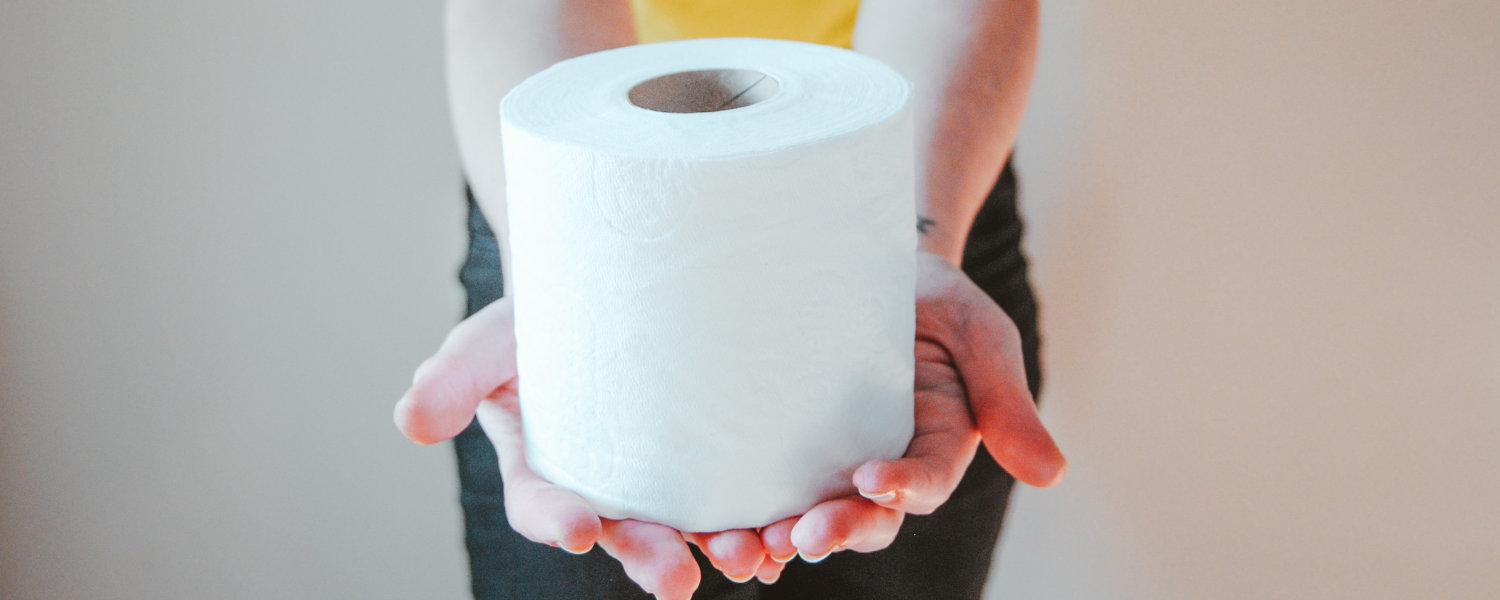If you have frequent stomach pain, especially before bowel movements, you may be among the 10-15% of Americans with IBS or irritable bowel syndrome.
IBS is one of the most common conditions doctors treat in their offices. Treatments for IBS focus on individual symptoms, but no single remedy covers all of its symptoms. According to our 2023 Conditions Report, IBS was a top condition for patients between 26 and 49 who were seeking to use medical cannabis. If you’re curious about treating IBS with CBD, there are a few factors to consider.
What is IBS?
Irritable bowel syndrome (IBS) is a group of symptoms that include abdominal pain and changes in bowel movements, including constipation, diarrhea, or both. There is no observable physical cause, like an obstruction or perforation of the bowel. Instead, the nerves that line the digestive system become hypersensitive and interrupt communication between the brain and gut. Unfortunately, treatment only addresses symptoms, and no cure is currently available.
The symptoms of IBS include pain in the lower abdomen and some changes in bowel movements. Stomach pain can range from sharp pain to cramping, bloating, distention, fullness, or burning.
Patients typically experience one of the categories of stool changes accompanying the pain: IBS-C, mostly constipated. IBS-D, mostly diarrhea or IBS-mixed, where movements vary between hard and loose. Other symptoms may include mucus in the stool, a sense of urgency to poop, or a feeling of incomplete evacuation when you still feel like you have to go.
Some symptoms, unrelated to the intestines, are frequently reported by IBS patients, including:
- migraines
- fibromyalgia
- sleep disturbances
- chronic pelvic pain
Doctors aren’t sure what causes IBS, but they know that the gut and brain communicate to control digestion. For people with IBS, food may travel too slowly or rapidly through the intestines, causing changes in bowel movements.
Women are more likely than men to have IBS, with up to 15% of the adult population in the US affected. Many report symptoms began in childhood or as young adults, and onset generally occurs before age 40.
IBS patients often share key indicators in their medical history, including a family member with IBS, childhood trauma, including stress or abuse, or mental issues like depression, anxiety, or extreme anxiety over physical symptoms (somatic symptom disorder). In some cases, IBS symptoms occur following changes in the gut biome, like a bacterial infection or overgrowth in the gut.
There is no diagnostic test to determine if you have IBS. Your clinical history and specific symptoms, along with pain levels, frequency of bowel movements, and stool texture, establish the diagnosis.
Doctors first rule out physical conditions like bowel obstructions or infections and may look for other underlying causes, like celiac disease or lactose intolerance. Physical exams, as well as blood and stool tests, help provide information. The treatment for IBS is multifaceted, including lifestyle changes, medicines, probiotics, and mental health therapy.
Lifestyle advice incorporates diet recommendations of increased fiber and avoiding gluten. A focused plan called the Low FODMAP diet lowers carbohydrate intake and avoids foods that are difficult to digest.
Medicines may ease specific IBS symptoms. Over-the-counter medications for constipation or diarrhea are available, or doctors may suggest targeted prescription treatment. For the accompanying abdominal pain, antispasmodics, antidepressants, or peppermint oil supplements may provide some relief.
An overabundance of harmful bacteria may interrupt gut-brain communication. Probiotics may restore the optimal balance of the good bacteria in the gut. If recommended, your doctor will advise you on the appropriate dosage and duration of probiotic treatment.
Given the symptoms of IBS and the potential therapeutic benefits of cannabis, many IBS patients wonder if there is a role for CBD in its treatment.
Benefits of Using CBD for IBS

The human endocannabinoid system (ECS) enables the body to process and use CBD for symptoms of irritable bowel syndrome. This complex system consists of receptors throughout the body, including in the brain, organs, and immune cells.
The ECS regulates and controls many body functions, including the gut, which regulates digestion, inflammation, and the overall functioning of the gastrointestinal tract. The management of gut homeostasis is essential for digestive health and well-being.
ECS receptors CB1 and CB2 control the activity of neurotransmitters.
CB1 receptors are key players in the endocannabinoid system, particularly within the intestinal lining and the enteric nervous system–a part of the nervous system that manages the digestive tract. These receptors help control bowel muscle tone and movement and regulate how food moves through the gut.
Inflammation is a common issue in gut disorders. CB2 receptors on the digestive system's nerve cells, enteric neurons, and immune cells oversee and manage inflammation, reducing cytokine and chemokine production. Additionally, CB2 receptors play a role in controlling food movement through the intestines for healthy gut motility. Their function aids in gut health maintenance and combats inflammation-related discomfort.1
Clinical endocannabinoid deficiency (CED) is a theory that suggests low levels of endocannabinoids in our body might lead to various conditions, including IBS, migraines, and fibromyalgia. This deficiency can result in heightened pain sensation (hyperalgesia), increased anxiety, and depression. When the endocannabinoid system isn’t functioning properly, it can manifest in varied symptoms impacting overall health and well-being.
Irritable bowel syndrome has different subtypes, IBS-D (diarrhea-predominant) and IBS-C (constipation-dominant), each showing different variations in the ECS.
IBS-D patients often have genetic changes affecting how their bodies process endocannabinoids, leading to lower levels of specific compounds like oleoylethanolamine (OEA) and palmitoylethanolamide (PEA) compared to healthy subjects. On the other hand, those with IBS-C show higher levels of OEA and changes in FAAH, an enzyme that breaks down endocannabinoids. These variations show the complexity of IBS and the role the ECS plays in how it presents in patients.
Research shows CBD’s potential as a treatment for IBS due to its safety and relief of symptoms. CBD, along with other agents like PEA and peppermint oil, show promise in improving IBS symptoms, such as abdominal spasms, cramps, and visceral pain, by modulating the ECS.
CBD may help regulate gut motility and food movement through the digestive tract, which could ease common IBS issues like irregular bowel movements. The cannabinoid might also play a role in reducing visceral hyperalgesia, the heightened pain sensation often experienced in the gut by IBS sufferers. Additionally, CBD may positively affect the gut-brain axis communication path between the stomach and the brain, potentially easing related symptoms that accompany IBS, like anxiety and stress.
There is still a need for comprehensive clinical trials to study the effectiveness of CBD in treating IBS.
CBD and IBS: Are There Any Risks?
CBD has therapeutic potential and generally receives a favorable safety profile from most medical experts and daily users. It’s well-tolerated by most individuals, including those undergoing treatment for epilepsy in clinical settings. It appears potentially helpful in managing conditions like IBS without significant adverse effects.
In clinical trials, CBD does present some adverse side effects, which could affect those using it for IBS treatments. These include drowsiness or sedation, making users feel unusually sleepy or relaxed; diarrhea, which may exacerbate IBS symptoms; loss of appetite; fatigue; and sleep disturbances. IBS patients should weigh these potential effects, especially if they already experience similar symptoms, in a decision to use CBD.2
The gastrointestinal effects of CBD may be concerning as cannabis has been documented as causing diarrhea in some users. For IBS patients, where bowel function is a key concern, this may complicate their symptoms.
Some studies have examined the impact of long-term CBD use on liver function. Research indicates that regular CBD use does not significantly affect liver enzyme levels in healthy adults, especially alanine aminotransferase (ALT), an enzyme indicative of liver health. For most individuals, CBD does not impact liver function, providing reassurance for those using it for conditions like IBS. High doses of CBD, as used in some studies, increase the concern for adverse side effects of drug interactions.
It’s important to note that CBD can interact with various medications, affecting how the body processes certain drugs and possibly altering their effectiveness or contributing to elevated liver enzymes.3 It’s necessary to consult with healthcare professionals before combining CBD with other treatments to ensure safe and effective care.
CBD as a Treatment for IBS

Using CBD for IBS is an emerging therapy. The endocannabinoid system, which regulates intestinal movement, internal organ sensitivity, and inflammation, influences many aspects of digestion and gut health. It also aids in communication between the gut and brain.
By acting on the ECS, CBD might improve symptoms like abdominal spasms, cramps, and pain. CBD’s effectiveness in pain relief prompts some researchers to suggest it be a first-line treatment for these symptoms. However, while promising, this approach is still in its early stages.
Through the observation of hospitalized patients, researchers note that irritable bowel syndrome (IBS) is associated with increased use of cannabinoid products. More clinical trials are underway to fully understand how CBD and other cannabinoids like THC can best treat IBS.
For example, researchers indicate that the ECS plays a different role in various types of irritable bowel syndrome (IBS). In a study with 40 patients who have IBS with diarrhea (IBS-D) and mixed symptoms (IBS-M), a medication named dronabinol, a synthetic THC, was found to make the colon more flexible and reduce its movement without changing pain sensation. Conversely, in another study of 136 patients with IBS with constipation (IBS-C), a medication called olorinab that targets a specific ECS receptor showed the most promise in providing pain relief.
Animal research has shown that cannabinoids (compounds found in cannabis) can affect various aspects of the gut, such as the tightness of connections between cells lining the gut, the activation of specific immune cells, and the interaction between gut bacteria and the immune system. These actions are important in managing symptoms of IBS and other disorders that affect digestion and gut function, collectively known as Disorders of Gut-Brain Interaction (DGBIs).4
And CBD, although generally considered safe, can increase the toxicity and side effects of some medications. Diarrhea is a common side effect and can be problematic for some with IBS.
While CBD and other cannabinoids present a hopeful future in IBS treatment, they aren’t ready to fully replace current therapies. However, they could be a beneficial supplement to existing treatments, especially for managing abdominal pain.
Tips for Using CBD for IBS
Before initiating any form of treatment with CBD for IBS, consult with a healthcare professional. They will determine whether CBD is safe to use considering your existing health conditions or medications and provide personalized advice.
If you’re just starting to attempt to treat your symptoms with cannabis, you may be wondering what the appropriate CBD dosage for IBS is. In general, start with a low dose. The recommended initial dose of CBD is between 2.5mg and 5mg. This conservative approach will help assess your body’s reaction to the cannabinoid.
If this dosage is well tolerated, you can gradually increase it in small increments of 2.5 to 5mg. Once you achieve the desired therapeutic effect, maintain that dosage level. Medical professionals and researchers suggest you shouldn’t exceed a maximum dosage of 1500mg daily.
If inhalation via joints, bongs, or dabs is your preferred method, begin with a single inhalation. Increase by one inhalation every 15-20 minutes until you reach desired symptom control.5
Remember that although CBD will not produce a high and is generally considered safe, it can cause side effects. These may include dry mouth, fatigue, and gastrointestinal discomfort. CBD’s effect on the GI tract leads many to wonder if CBD causes constipation. The results are conflicting, with some people reporting adverse digestive side effects like diarrhea.
Monitor for any adverse reactions, especially when using other medications, since CBD can interact with other drugs. If you experience discomfort or serious side effects, discontinue use and contact your doctor.
It’s vital to source your CBD products carefully. The quality of CBD products varies. High-quality, lab-tested products ensure purity and potency and reduce the risk of contaminants. Look for companies that provide transparent lab results and clear ingredient labeling.
Combining CBD with healthy lifestyle choices and medical guidance offers the best results for treating IBS. If recommended, follow a balanced or FODMAPS diet, stay hydrated, and use appropriate stress management techniques like exercise.
Ask a Budtender: Which CBD Products are Best For IBS?

Current studies present anecdotal and researched evidence to support some suggestions for the best types of cannabis products for effectively and efficiently managing IBS and its symptoms.
Patients may have a preference for alcohol-based over oil-based tinctures for IBS symptom control, as many oil-based tinctures are made with MCT oil, which may upset the gut of individuals with IBS if taken in certain amounts.
For IBS, one study highlights the potential synergistic effects of combining CBD with fish oil to provide a soothing barrier while reducing intestinal inflammation.6
Another consideration is the spectrum of CBD in the products. Full-spectrum CBD contains all the natural compounds, including terpenes, and may offer enhanced benefits.
The adequate CBD dosage for IBS studied ranges significantly. According to one study, doses can range from as low as 20mg to as high as 500mg per day. A specific case presented a patient who found relief from her IBS with a regimen of 25mg of CBD three times daily.7
A general recommendation for starting CBD is to use the “start low, go slow” method, beginning with a low dose and gradually increasing it based on your symptom relief and tolerance levels. This approach allows you to find the most effective dose of CBD for constipation, diarrhea, or mixed IBS symptoms while minimizing side effects and maximizing effectiveness.
References
- Brugnatelli V, Turco F, Freo U, Zanette G. Irritable Bowel Syndrome: Manipulating the Endocannabinoid System as First-Line Treatment. Front Neurosci. 2020;14:371. Published 2020 Apr 21. doi:10.3389/fnins.2020.00371 ↩︎
- Millar SA, Maguire RF, Yates AS, O’Sullivan SE. Towards Better Delivery of Cannabidiol (CBD). Pharmaceuticals. 2020;13(9):219. doi:https://doi.org/10.3390/ph13090219 ↩︎
- Kaufmann R, Aqua K, Lombardo J, Lee M. Observed Impact of Long-term Consumption of Oral Cannabidiol on Liver Function in Healthy Adults. Cannabis and Cannabinoid Research. 2021;8(1). doi:https://doi.org/10.1089/can.2021.0114 ↩︎
- Brierley SM, Greenwood-Van Meerveld B, Sarnelli G, Sharkey KA, Storr M, Tack J. Targeting the endocannabinoid system for the treatment of abdominal pain in irritable bowel syndrome. Nature Reviews Gastroenterology & Hepatology. 2022;20(1):5-25. doi:https://doi.org/10.1038/s41575-022-00682-y ↩︎
- MacCallum CA, Russo EB. Practical considerations in medical cannabis administration and dosing. European Journal of Internal Medicine. 2018;49(49):12-19. doi:https://doi.org/10.1016/j.ejim.2018.01.004 ↩︎
- Story G, Briere CE, McClements DJ, Sela DA. Cannabidiol and Intestinal Motility: a Systematic Review. Current Developments in Nutrition. 2023;7(10):101972-101972. doi:https://doi.org/10.1016/j.cdnut.2023.101972 ↩︎
- Pitliuk R, Fucci TPP da CS. Cannabidiol in the Treatment of Irritable Bowel Syndrome. Journal of Coloproctology. 2021;41(04):455-456. doi:https://doi.org/10.1055/s-0041-1739168 ↩︎
The information in this article and any included images or charts are for educational purposes only. This information is neither a substitute for, nor does it replace, professional legal advice or medical advice, diagnosis, or treatment. If you have any concerns or questions about laws, regulations, or your health, you should always consult with an attorney, physician or other licensed professional.




